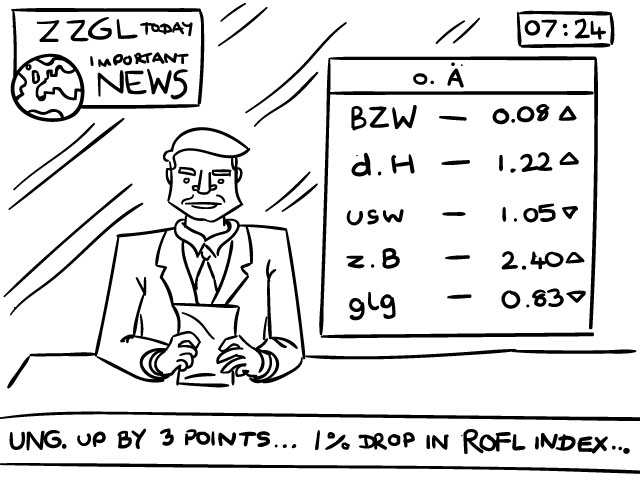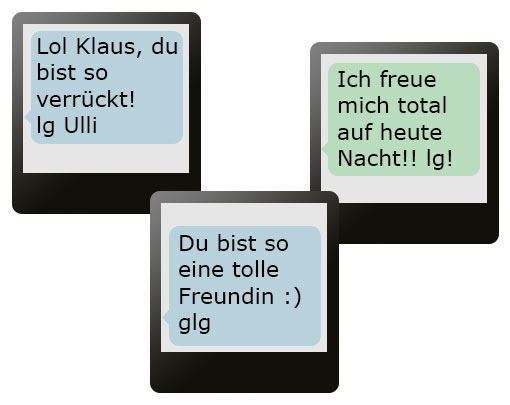Boy howdy, German loves abbreviations. Particularly in emails and official municipal writings, the writing is peppered with odd little fragments like bzw and usw and z.B….omg, it’s like fml, seriously wtf. ANYWAY, enough whimsy. Let’s look at some of the most popular ones, and how to use them properly.
usw
Stands for: und so weiter – etcetera
This is probably the easiest one to use – just throw it in there wherever you would use etc in English, for example at the end of a list or extended description. Just remember that with usw you don’t put a full-stop/period after it unless it’s at the end of a sentence.
Wir verkaufen Computer, Lautsprecher, Küchengeräte usw.
Bitte bringt Ihre Unterlagen, Reisepass usw mit.
z.B.
Stands for: zum Beispiel – for example
Use z.B. where you would use e.g. in English, to introduce an example.
Beim Great British Bake-Off backt man jede Woche eine andere Art von Gebäck, z.B. Kekse.
Superhelden, z.B. Batman, sind heutzutage überflüssig.
bzw
Stands for: beziehungsweise – no direct translation, but has the sense of ‘and/or’ or ‘that is to say’
Bzw and the full word beziehungsweise are a little tricky because they have no English equivalent but are used all the time in German. You use bzw when you refer to one thing which you then want to clarify or expand upon; bzw comes after the first thing you are describing, and after bzw you give your clarification, additional idea or extra description. It’s best understood by looking at a few examples:
Bitte schicken Sie mir den Vertrag bzw. Ihre Steuernummer so bald wie möglich.
Ich möchte wissen, was dein Feedback bzw. deine Verbesserungsvorschläge sind.
Habt ihr Schwierigkeiten bzw. Verspätungen bei diesem Projekt erlebt?
Beziehungsweise can also be used in the sense of ‘respectively’ when you are referring to two or more things which you then want to refer back to with further details which apply respective to each individual thing, just as you would say in English: ‘The shop opens on Wednesdays and Fridays at 9am and 11am respectively.’
Eintritt kostet für Erwachsene und Kinder 11€ bzw. 9€.
Bei den Finanz- und Personalabteilungen können Sie Ihren Lohn bzw. Ihren Urlaub besprechen.
d. h.
Stands for: das heißt – meaning or used in the sense of i.e.
D.h. helps you to give further clarification or definition to a concept which you have already mentioned. Simply put it after your initial concept description, typically with a comma in between, and then follow it with your clarifying statement.
Ich muss nächste Woche eure Projekte bewerten, d.h. das Deadline ist am Freitag um 12:00 Uhr.
Die Wohnung ist ein Penthouse, d.h. sie liegt im Dachgeschoss.
Diese Krankheit ist rein genetisch, d.h. von der DNA verursacht.
zzgl.
Stands for: zuzüglich – plus, in addition
Use it in the same place that you would use plus in English. Zzgl. puts the noun following it into the genitive case.
Das Handy kostet 150€ zzgl. 20€ monatlicher Gebühr.
Die Fahrt dauert 3 Stunden zzgl. 15-30 Minuten Umsteigezeit.
ung.
Stands for: ungefähr – roughly, approximately
Use it in front of the rough value you want to give for something which has a quantity, weight, time, price etc.
Ung. 150 Leute waren auf der Hochzeit.
Für jedes Kuchenrezept brauchst du ung. 50g Butter pro 1 Ei.
o. Ä.
Stands for: oder Ähnliches (or Ähnlichem in the dative case) – or similar, in colloquial cases in the sense of ‘or something like that’
Use it after a term if you want to refer to similar ideas or concepts in a very general sense without having to list more stuff. The umlauted A should always be capitalised. The reason why is a little bit complicated, so I’ll break it down into digestible bits for you:
– you need to describe a thing where you know what it is like but you don’t know exactly what it is, for example ‘something pretty’ or ‘something terrible’.
– in German, you can use ‘etwas’ to refer to ‘something’
– however, ‘etwas’ doesn’t really count as a true noun (you can’t have ‘ein Etwas’ or ‘fünf Etwasse’)
– you do, however, need a noun in the phrase to make it grammatically correct.
– therefore, you make the adjective into a noun (with neuter ending, since ‘etwas’ has no gender) to fill this requirement: etwas Schönes, etwas Furchtbares.
– because this new noun you’ve created can stand by itself, ‘etwas’ can be left in or left out according to how you want your whole sentence to work: Ich habe etwas Furchtbares erlebt vs. Bei uns Schönes kaufen!
Es wäre super, wenn jeder eine Flasche Wein o. ä. mitbringen würde.
Achtet bitte auf stechende Insekten (Mücken o. Ä.)!
Epilogue: lg and glg
In English, when signing off a text message or email to your bezzy mate or that babe you fancy from work, you might put an ‘x’ or ‘xxx’ or even ‘xxxxxxxxxxxxxxxxxxxxxx’ at the end of your message. Germans don’t do that, and you’d probably do well to avoid ever writing ‘xxx’ into your text messages to German people, since they will think you mean something extremely saucy.
In German, you sign off a message to someone you’re fond of with lg, meaning ‘liebe Grüße’ (which literally means ‘kind greetings’ but has a much more casual and affectionate sense, more like ‘cheers!’ or ‘hugs!’). Using it with an exclamation mark is lighthearted and much more affectionate, like ‘you’re the best!’ or ‘much love!’. Glg stands for ganz liebe Grüße and is even friendlier, a bit like ‘love’ or ‘xxxxxxxxxxxxxxxxxxxxxxxxxxxxx’. For example:
Gradually, you’ll get so comfortable using all these abbreviations that you’ll barely need to use words at all anymore. Then, maybe, you might start talking that way and people will think you are a malfunctioning robot. Until that time, try to notice these abbreviations as you read German texts, and each time you see one, think why it’s there and what it’s doing in the text. Ok, that’s all, gtg ttfn!!




Good article, nobdy tells you about these abbvs. Needs a whole bunch of grammar cards on its own. Glg.